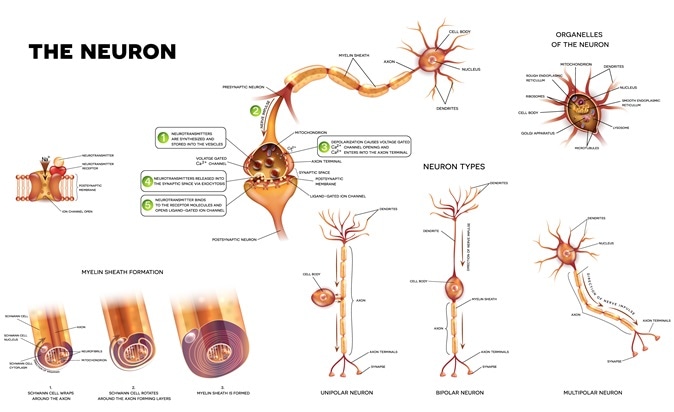Scientists have long debated the fact that brains change with age and no new brain cells or neurons are added once an adult is fully grown. With age the number of neurons begins to decline leading to several problems with memory and cognition.
According to a new study from the Columbia University however, brain cells are continuously added to our brains even when we reach our 70s. This is a process called neurogenesis. Their work is published in a study that appeared in the latest issue of the journal Cell Stem Cell this week.

Neuron detailed anatomy illustrations. Neuron types, myelin sheath formation, organelles of the neuron body and synapse. Image Credit: Tefi / Shutterstock
Lead author Dr. Maura Boldrini, a research scientist at the department of psychiatry, Columbia University and her colleagues investigated the brains of 28 dead people aged between 14 and 79 years. They were studying the effects of aging on the brain’s neuron production. The team examined the brains that were donated by the families of the deceased at the time of death. The brains were frozen immediately at minus-112 degrees Fahrenheit before they could be examined. This preserved the tissues.
Neurogenesis has been shown to decline with age in lab mice and rats as well as in experimental primates. The team wanted to explore if same rates of decline are seen in human brains as well. So they checked the brains samples for developing neurons. These developmental stages included stem cells, intermediate progenitor cells, immature neuronal cells and finally new mature neurons. They focused on the hippocampus region of the brain that deals with memory and emotional control and behavior.
The results revealed that for all age groups, the hippocampus shows new developing neurons. The researchers concluded that even during old age, the hippocampus continues to make new neurons. The differences that they noted with age include reduction in the development of new blood vessels as people got older. The proteins that help the neurons to make new connections are reduced with age. This was a finding that differentiated ageing brains from younger ones, they explained. Boldrini said the new neurons are there in older brains but they make fewer connections than younger brains. This explains the memory losses and decrease in emotional resiliency in older adults she said.
An earlier study last month came from another set of researchers led by University of California San Francisco researcher Arturo Alvarez-Buylla. The study titled, “Human hippocampal neurogenesis drops sharply in children to undetectable levels in adults,” was published first week of March this year in the journal Nature.
The team found that after adolescence there is little or no neurogenesis in the brain. They examined the brains of 17 deceased individuals and 12 patients with epilepsy part of whose brains had been surgically resected. The debate between the two teams continues. Boldrini explained that Buylla’s team had examined different types of samples that were not preserved as her samples had been.
Further the other team examined three to five sections of the hippocampus and not the whole of it she explained. More studies on this needed to make concrete conclusions regarding neurogenesis in the elderly say experts.
References